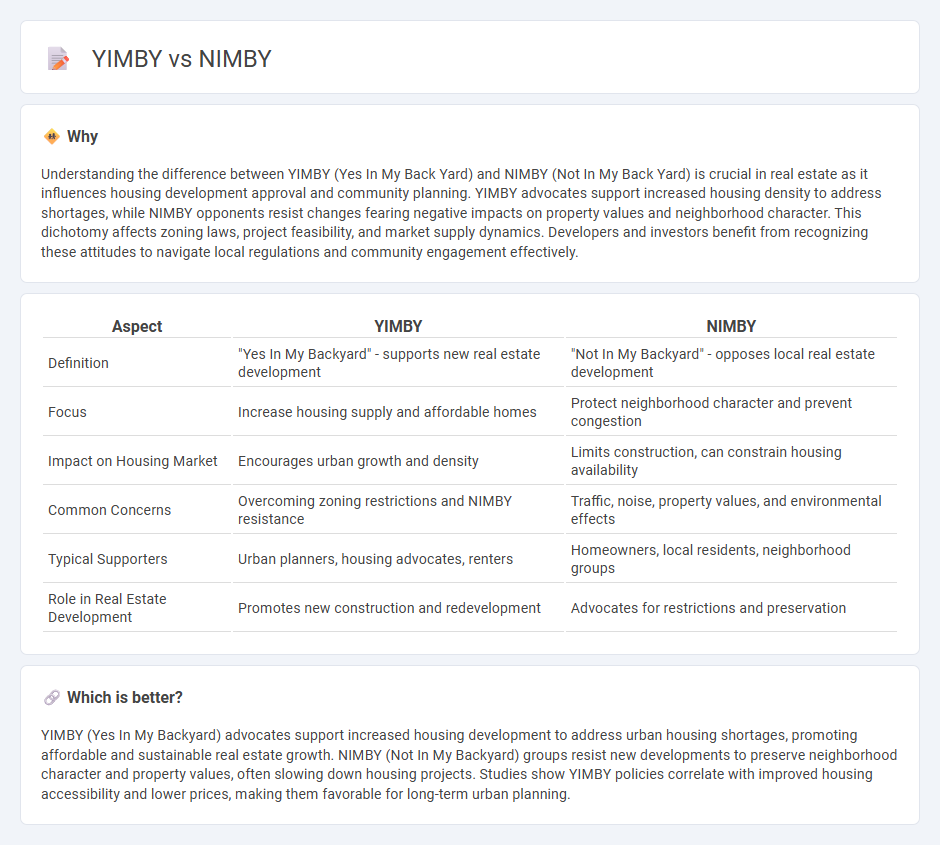
YIMBY (Yes In My Backyard) advocates promote increased urban development and affordable housing to address growing population demands and combat housing shortages. NIMBY (Not In My Backyard) opponents resist new construction projects due to concerns about environmental impact, neighborhood character, and property values. Explore the contrasting perspectives shaping real estate development decisions and community growth.
Why it is important
Understanding the difference between YIMBY (Yes In My Back Yard) and NIMBY (Not In My Back Yard) is crucial in real estate as it influences housing development approval and community planning. YIMBY advocates support increased housing density to address shortages, while NIMBY opponents resist changes fearing negative impacts on property values and neighborhood character. This dichotomy affects zoning laws, project feasibility, and market supply dynamics. Developers and investors benefit from recognizing these attitudes to navigate local regulations and community engagement effectively.
Comparison Table
| Aspect | YIMBY | NIMBY |
|---|---|---|
| Definition | "Yes In My Backyard" - supports new real estate development | "Not In My Backyard" - opposes local real estate development |
| Focus | Increase housing supply and affordable homes | Protect neighborhood character and prevent congestion |
| Impact on Housing Market | Encourages urban growth and density | Limits construction, can constrain housing availability |
| Common Concerns | Overcoming zoning restrictions and NIMBY resistance | Traffic, noise, property values, and environmental effects |
| Typical Supporters | Urban planners, housing advocates, renters | Homeowners, local residents, neighborhood groups |
| Role in Real Estate Development | Promotes new construction and redevelopment | Advocates for restrictions and preservation |
Which is better?
YIMBY (Yes In My Backyard) advocates support increased housing development to address urban housing shortages, promoting affordable and sustainable real estate growth. NIMBY (Not In My Backyard) groups resist new developments to preserve neighborhood character and property values, often slowing down housing projects. Studies show YIMBY policies correlate with improved housing accessibility and lower prices, making them favorable for long-term urban planning.
Connection
YIMBY (Yes In My Back Yard) and NIMBY (Not In My Back Yard) represent opposing community attitudes towards real estate development, where YIMBY advocates support increased housing density and affordable construction, while NIMBY groups resist changes due to concerns over property values and neighborhood character. Both movements significantly influence urban planning policies, zoning regulations, and housing market dynamics, impacting housing supply and urban growth. Understanding the dialogue between YIMBY and NIMBY is crucial for addressing housing shortages and fostering sustainable real estate development.
Key Terms
Zoning
NIMBY (Not In My Backyard) and YIMBY (Yes In My Backyard) represent opposing attitudes toward zoning policies impacting urban development and housing availability. NIMBY advocates often resist zoning changes that increase density or alter neighborhood character, while YIMBY supporters promote zoning reforms to allow more affordable and diverse housing options. Explore the implications of these zoning debates for sustainable urban growth and housing equity.
Housing Density
NIMBY (Not In My Backyard) movements often resist increasing housing density, citing concerns over neighborhood character and infrastructure strain. YIMBY (Yes In My Backyard) advocates push for higher-density housing to address urban housing shortages and affordability crises, promoting the development of multi-family units and mixed-use projects. Explore our detailed analysis to understand how these opposing viewpoints impact urban planning and housing policy.
Land Use Policy
NIMBY (Not In My Backyard) and YIMBY (Yes In My Backyard) represent opposing perspectives in land use policy debates, with NIMBY advocating against local development projects to preserve neighborhood character and YIMBY promoting increased housing density and urban growth to address housing shortages. Land use policy decisions influenced by these movements impact zoning regulations, affordable housing availability, and sustainable urban planning initiatives. Explore further how NIMBY and YIMBY dynamics shape the future of cities and land use governance.
Source and External Links
NIMBY - NIMBY is an acronym for "Not In My Back Yard," describing opposition by residents to local development projects, often due to concerns about property values, crime, and quality of life.
What Is NIMBYism? - NIMBYism often involves concerns about crime, congestion, and property values, especially in the context of affordable housing, where fears rarely materialize.
NIMBY | Meaning, Examples, & Facts - The term NIMBY signifies opposition to placing undesirable facilities in one's own neighborhood, often linked to quality of life and property value concerns.
 dowidth.com
dowidth.com